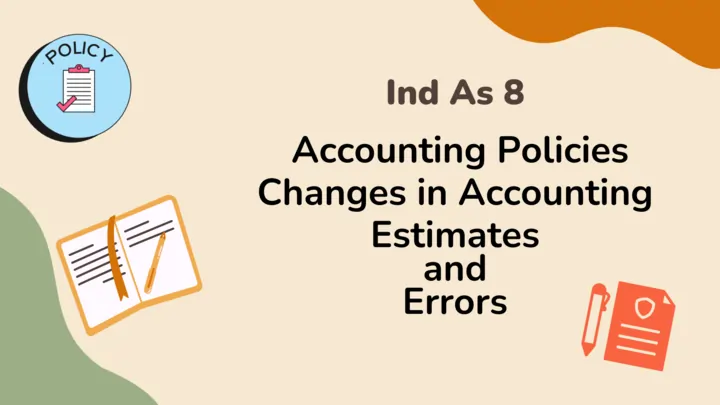Table of Contents
In the world of accounting and financial reporting, it is essential to have clear guidelines and standards to ensure consistency and transparency. Ind AS 8, also known as “Accounting Policies, Changes in Accounting Estimates, and Errors“, provides the framework for selecting and applying accounting policies, handling changes in estimates, and correcting errors. Let’s dive into the details of Ind AS 8 and understand its key concepts.

Scope and Objective:
Ind AS 8 aims to enhance the relevance and reliability of financial statements by providing guidance on the selection and application of accounting policies. It sets out the requirements for changing accounting policies, making estimates, and correcting errors, ensuring that entities present their financial information in a consistent and accurate manner.
Accounting Policies:
An accounting policy refers to the specific principles, bases, conventions, rules, and practices adopted by an entity to prepare and present its financial statements. This standard emphasizes the importance of selecting appropriate accounting policies that result in relevant and reliable financial information. Entities should consider relevant Ind AS requirements and apply judgment in developing and applying these policies.
Changes in Accounting Estimates:
Estimates are an integral part of financial reporting, as they are necessary for dealing with uncertainties inherent in various transactions and events. This standard provides guidance on handling changes in accounting estimates. If new information becomes available or circumstances change, entities must revise their estimates prospectively. Changes in estimates should be disclosed in the financial statements.
Correction of Errors:
Errors can occur in financial statements due to oversight, mathematical mistakes, or misapplication of accounting policies. Its sets out the requirements for correcting such errors. There are two types of errors First material errors and Second Immatrial errors. Differentiating between material and immaterial errors is important for financial reporting because it helps ensure that significant errors are appropriately recognized, corrected, and disclosed, while minor errors are not overly emphasized.
Material errors require a restatement of the financial statements to reflect the correction, whereas immaterial errors are typically adjusted in the current period without restating prior periods.
Material errors:
Material errors refer to errors in financial statements that, either individually or collectively, could influence the economic decisions of users based on the information presented. These errors are considered significant and can impact the overall assessment of a company’s financial performance, position, or cash flows. Materiality is determined based on the nature and magnitude of the error, as well as the specific circumstances surrounding it.
Immaterial errors:
on the other hand, are errors that do not have a significant impact on the financial statements. They are considered minor or inconsequential and are unlikely to influence the economic decisions of users. Immaterial errors are typically corrected through regular ongoing accounting processes and are not subject to separate disclosure requirements.
Application of Judgement:
Ind AS 8 acknowledges that the preparation of financial statements often requires judgment in selecting and applying accounting policies, making estimates, and correcting errors. Entities should exercise professional judgment and consider the principles and requirements of Ind AS when applying these provisions.
Determining the materiality of an error involves exercising professional judgment and considering factors such as the size of the error in relation to the financial statements, the nature of the item affected, the impact on key financial ratios, and the expectations of users.
Disclosures:
- Ind AS 8, “Accounting Policies, Changes in Accounting Estimates, and Errors,” outlines the disclosure requirements related to accounting policies, changes in accounting estimates, and the correction of errors.
- Ind AS 8 requires entities to disclose their significant accounting policies, including the measurement bases used and any specific accounting policies unique to the entity’s operations or industry.
- When an entity changes its accounting policies, Ind AS 8 mandates disclosure of the nature of the change, the reasons for the change, and the impact on the financial statements.
- Entities are required to disclose significant changes in accounting estimates during the reporting period. This includes disclosing the nature of the change, the reasons for the change, and the amounts involved.
- The standard requires entities to disclose the nature and impact of material prior-period errors that have been corrected in the current period.
Conclusion:
Ind AS 8 plays a crucial role in ensuring consistent and reliable financial reporting by providing guidance on accounting policies, changes in accounting estimates, and the correction of errors. By understanding and applying the provisions of this standard, entities can maintain transparency and integrity in their financial reporting practices.
FAQ:
How does Ind AS 8 define accounting policies?
It defines accounting policies as the specific principles, bases, conventions, rules, and practices applied by an entity in preparing and presenting financial statements.
Does this standard allow changes in accounting policies?
Yes, it allows changes in accounting policies if they result in more reliable and relevant information. However, any changes must be applied retrospectively, unless it is impracticable to do so.
How does Ind AS 8 differentiate between changes in accounting estimates and errors?
Ind AS 8 defines changes in accounting estimates as adjustments made to prior period amounts due to new information or developments. Errors, on the other hand, are the result of mathematical mistakes, omissions, or misinterpretations in financial statements.